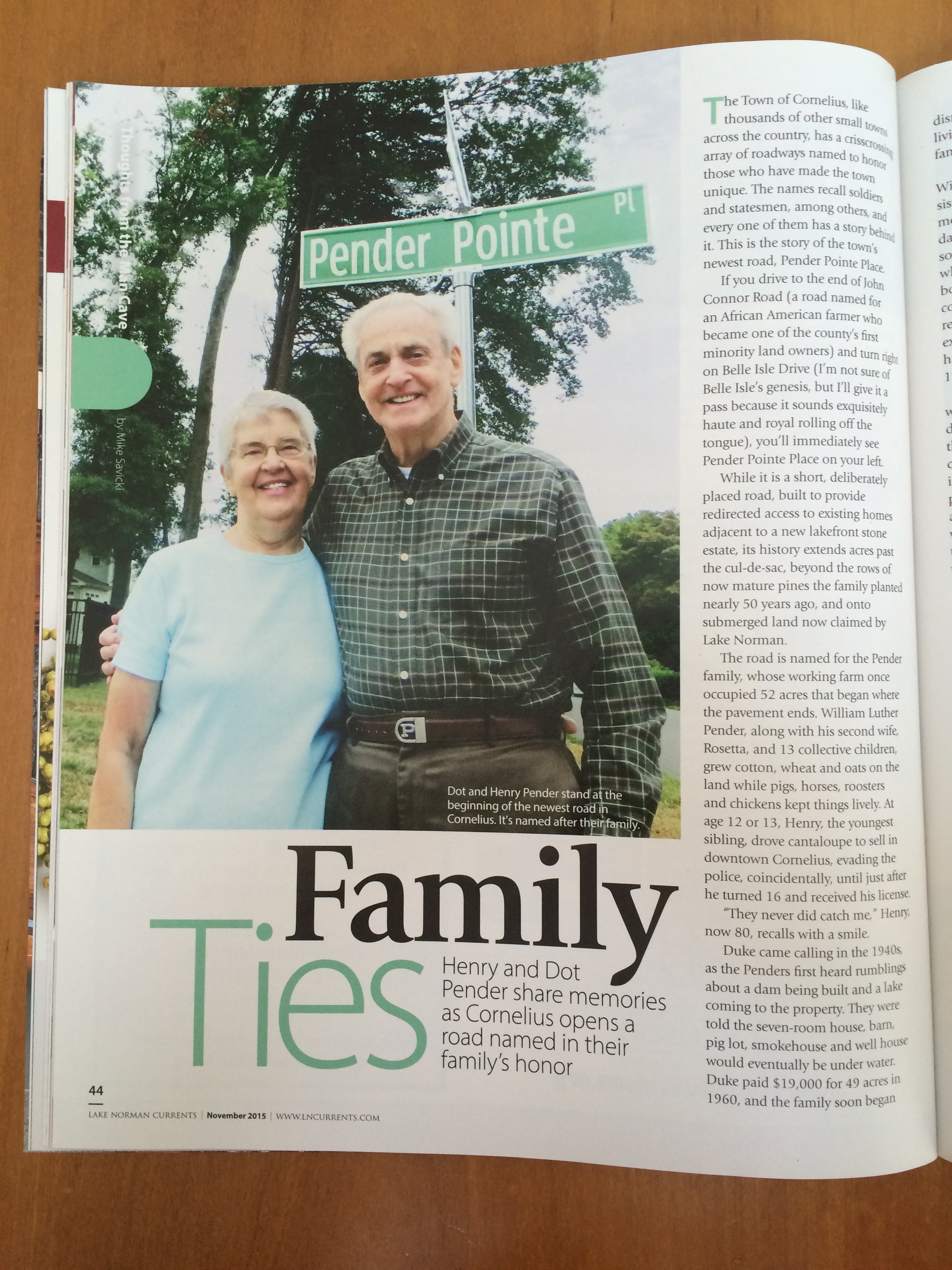Family Ties
Henry and Dot Pender share memories as Cornelius opens a road named in their family’s honor
By Mike Savicki
The Town of Cornelius, like thousands of other small towns across the country, has a crisscrossing array of roadways named to honor those who have made the town unique. The names recall soldiers and statesmen, among others, and every one of them has a story behind it. This is the story of the town’s newest road, Pender Point Place.
If you drive to the end of John Connor Road (a road named for an African American farmer who became one of the county’s first minority land owners) and turn right on Belle Isle Drive (I’m not sure of Belle Isle’s genesis, but I’ll give it a pass because it sounds exquisitely haute and royal rolling off the tongue), you’ll immediately see Pender Pointe Place on your left. While it is a short, deliberately placed road, built to provide redirected access to existing homes adjacent to a new lakefront stone estate, its history extends acres past the cul-de-sac, beyond the rows of now mature pines the family planted nearly fifty years ago, and onto submerged land now claimed by Lake Norman.
The road is named for the Pender family, whose working farm once occupied 52 acres that began where the pavement ends. Mr. William Luther Pender, along with his second wife, Rosetta, and thirteen collective children, grew cotton, wheat and oats on the land, while pigs, horses, roosters and chickens kept things lively. At age 12 or 13, Henry, the youngest sibling, drove cantaloupe to sell in downtown Cornelius, evading the police, coincidentally, until just after he turned 16 and received his license.
“They never did catch me,” Henry Pender, now 80, recalls with a smile.
Duke came calling in the 1940’s as the Penders first heard grumblings about a dam being built and a lake coming to the property. They were told the seven-room house, barn, pig lot, smokehouse, and well house would eventually be under water. Duke paid $19,000 for 49 acres in 1960 and the family soon began dismantling their home. The bedrooms, living areas and even the kitchen went to family members elsewhere.
In the meantime, Henry met Dorothy Williams in 1953 through one of Henry’s sister’s daughters. (They recall first having met at a church social, but Henry was dating someone else at the time.) The teens soon began talking and in 1954, Henry, who was raising cotton on the property, bought wedding rings with one bail of cotton. To this day, neither Henry nor Dot remembers if the money came from an extra bail or if Henry’s dad allowed him to have a bail. They married when Henry was 19 and Dot 17.
When the lake filled, Henry and Dot, who had been given one of the twelve sub-divided plots of the family’s remaining three acres, watched in amazement as their childhood playground was transformed into waterfront. They first built a shelter to provide shade on hot summer days, then a cabin, and then a larger replacement when a 6’3” son-in-law couldn’t fit inside the first. Together, they all began enjoying weekends playing lakeside, eventually with electricity, but never running water.
To Henry and Dot, who had settled on two acres along Hwy 73 and Beatties Ford Road (which also came with the Duke purchase) to accommodate their tractors, trailers and heavy yard equipment, the sub-divided land never again became a family home. It simply became a place for gatherings, day trips and outings. Their three children, Rick, Donna and Kelly, grew playing at the water’s edge.
“When our children were little, we came almost every weekend,” Dot Pender, 78, says. “They would go in the water clean and come out covered in mud. That’s because the soil and the clay hadn’t yet settled.”
When The Peninsula was built, the Penders again rolled with the change.
“We took it as it was,” says Henry. “As long as we had a way to get to our property, and see to friends and family at the end of whatever road we used, we went with the changes.”
Decades have passed and now, from their Huntersville kitchen window, Henry and Dot can see the lake off in a distance to the northwest. They say the sunsets through the window are pretty, but they are nothing like seeing the moon coming up over the water at what is now the end of Pender Pointe Place. Henry and Dot do occasionally make trips to see the moon, but wish they did it more often, agreeing there is nothing like seeing the light as it ripples on the water and brightens the night.
Their children were the first to see the new street sign as they arrived to enjoy a late summer weekend. They were so proud and excited that they sent their parents a picture.
Standing under the sign on a recent early fall day, Dot told me, “When we were seventeen, we never could have imagined life fifty and sixty years later. We couldn’t comprehend what might come down the road, and we never imagined that any of these changes, especially a road, would happen.
“But through all the changes,” she continues, “there has always been family. What Henry and I have learned throughout our life on this property is to try to enjoy what’s here now instead of worrying about what’s next. And to us, that has always been family.”
May all who pass Pender Pointe Place be reminded about the love of family.
This article was originally published in Currents Magazine in 2015.

